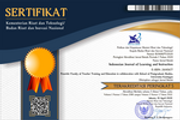AVAILABILITY AND UTILIZATION OF E-COUNSELLING PLATFORMS FOR QUALITY DISTANCE LEARNING IN NATIONAL OPEN UNIVERSITY OF NIGERIA
Abstract
The emergence of technology has made it possible for counsellors all over the world to reach their clients in distant locations without compromising the principle of confidentiality. This study examined the availability and utilization of e-counselling platforms in counselling students for quality distance learning in the National Open University of Nigeria (NOUN). Through purposive research design using 56 professional counsellors in the university, five research questions and two hypotheses were formulated to guide the study. Data collection was through a self-structured questionnaire that sought information from the respondents on the availability, utilization, challenges and possible solutions to e-counselling platforms in NOUN. Both descriptive and inferential statistical tools were used to analyse the data using the SPSS platform. The results of the study showed that most of the modern social media platforms for e-counselling are not available for use in the university. In effect, there are challenges that face the utilization of e-counselling platforms, which include inadequate power supply and lack of ICT facilities. The study recommended the provision of alternative power supply, free data for students and counsellors as well as computerized counselling laboratories with internet connections for students and counsellors in all the study centres of the university.
Keywords: availability; utilization; e-counselling; distance learning.
Full Text:
PDFReferences
Anyamene, A. N., Nwokolo, C. N., & Anyachebulu, E. F. (2012). Availability and use of information and communication technology resources for counselling university students in South East States, Nigeria. International Journal of Humanities and Social Sciences, 2(7), 220-225.
Apagu, V. V., & Wakili, B. A. (2015). Availability and utilization of ICT facilities for teaching and learning of vocational and technical education in Yobe State Technical Colleges. American Journal of Engineering Research, 4(2), 113-118.
Ayiro, L. P. (2013). Acquisition and utilization of ICT skills among university lecturers in Sub-Africa: A case of universities in Kenya. Journal of Continuous, Open and Distance Education, 2(1), 103-127.
Brown, C. (2012). Online counselling: Attitude and Potential utilization by college students. M. A. Thesis submitted to the Faculty of Education, Humboldt State University.
Green, R., & Yallow, R. (2002). Technology and its impact in classroom. New York: Cambridge University Press.
Kolog, E. A. (2014). E-counselling implementation: Contextual approach. Master’s Thesis submitted to the University of Eastern Finland.
Nnaka, C. V., & Ezekannagha, G. N. (2013). Student support services in open and distance learning at NOUN. In T. A. Bolarin, & G. C. Unachukwu (Eds.), Education for all: Progress and challenges (pp. 147-155). Lagos: Nigerian Academy of Education.
Odeleye, D. A. (2009). Repositioning Nigerian education for relevance in the 21st century. Ibadan: College Press & Publishers Ltd.
Ojo, D. O. (2013). Enhancing access to learning through blended learning and convergence approaches in open and distance education. West African Journal of Open and Flexible Learning, 2(2), 27-37.
Okopi, F. O. (2010). Challenges of technology mediated approach to counselling in the National Open University of Nigeria (NOUN). African Journal of Political Science and International Relations, 4(4), 115-119.
Okoroegbe, F. N. (2013). Social media networks as interactive counselling platform: A National Open University of Nigeria survey. West African Journal of Open and Flexible Learning, 2(2), 75-95.
Omeje, J. C., Eze, J. U., & Egeonu, D. C. (2016). Utilization of E-counselling in career information dissemination among undergraduates of Federal Universities in South East Nigeria. SAGE and Open Access Journal, 1-8, April-June.
Shiller, I. (2009). Online Counselling: A review of the literature. Retrieved from www.emys.on.ca/pdfs.../onlinecounselling_literaturereview.pdf
Shiran, R. (2001). ICT in counselling in the classroom. London: Routledge Publishers.
Tahir, G. (2016). Re-tooling pre- and in-service teacher education through open and distance learning (ODL). First Public Lecture Series of the Faculty of Education, National Open University of Nigeria, Abuja, 4thSeptember.
Ukwueze, A. C. (2016). E-counselling for learner support services in ODL institutions: A practical approach. West African Journal of Open and Flexible Learning, 4(2), 43- 58.
UNESCO (2002). Open and distance learning: Trends, policy and strategy considerations. Paris: UNESCO Press.
Yaphe, J. & Speyer, C. (2010). Text-based online counselling: Email. In R. Kraus, J. S. Zack, & G. Stricker (Eds.), Online Counselling: A handbook for mental health professionals (2nd ed.), 2-18. San Diego, CA: Elsevier Academic Press.
Zamani, Z.A. (2009). Computer Technology and Counselling. Proceedings of the 2nd International Conference on Computer Science and Information Technology (ICCSIT) of Institute of Electrical and Electronics Engineers (IEEE) Held in Beijing. 488-490, August 8-11.
DOI: https://doi.org/10.25134/ijli.v1i2.1486
Refbacks
- There are currently no refbacks.
Copyright (c) 2018 Indonesian Journal of Learning and Instruction

This work is licensed under a Creative Commons Attribution-NonCommercial-ShareAlike 4.0 International License.

